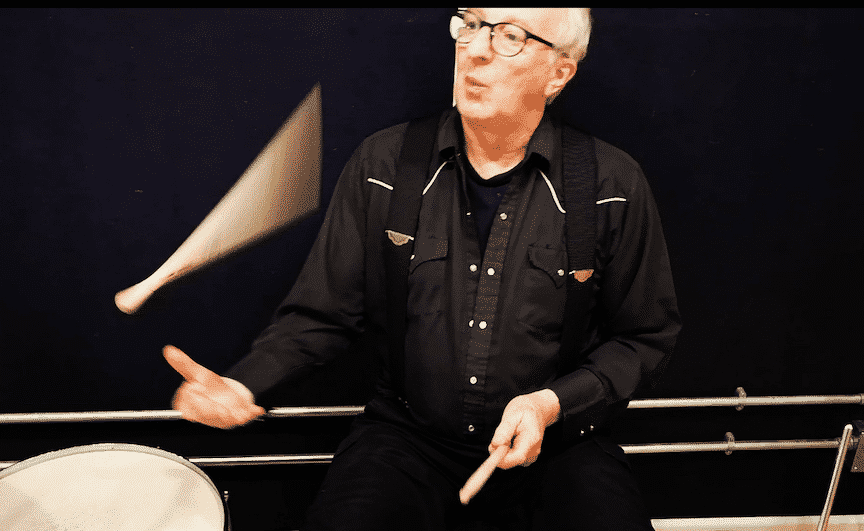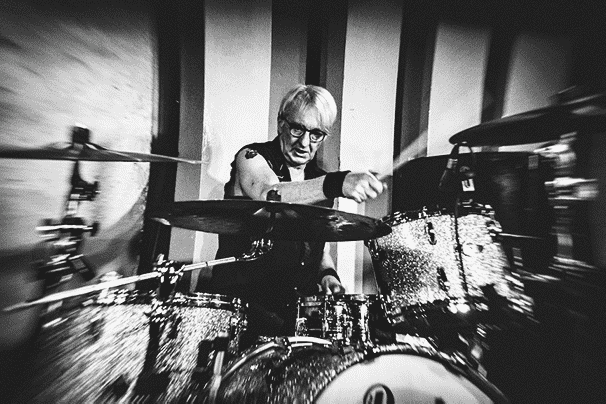Rat Scabies on the Upcoming Album by Professor and the Madman


Rat Scabies came to prominence with the Damned, the first British punk band to release a single (“New Rose,” October 1976), put out a full-length album (Damned Damned Damned, February 1977), and tour the U.S. (spring of ’77). Rat left the Damned in the mid-’90s, but has kept busy and surprising, playing with British folk-pop icon Donovan, releasing solo music, and appearing as the central character of the book Rat Scabies and the Holy Grail. He’s also worked with several rock outfits, including the Professor and the Madman. The trans-Atlantic band features former Adolescents and D.I. vocalist/guitarist Alfie Agnew, ex-D.I. and Mind Over Four vocalist/guitarist Sean Elliott, and Scabies’ old Damned bandmate Paul Gray on bass. The band will be releasing the album Séance in November, and we asked Rat to give us some background.
MD: Were you hoping to achieve anything different with Séance compared to the band’s earlier albums, in terms of what the songs represented or sounded like?
Rat: The goal is always to improve. But it’s not something you do as a conscious decision. It’s more driven by the notes that are already laid down and coming through my headphones. The song dictates the direction. I can’t really bring a punk sensibility to a ballad.
MD: What drum gear did you use to record Séance?
Rat: A 1958 Leedy drumkit, 2002 Paiste cymbals, Aquarian US Vintage drumheads, and Vater drumsticks.
MD: Were there any tracks that were especially challenging to play or record?
Rat: Not really, if I’m honest. But there is a heavy, sort of late-’80s Sunset Strip rock track on the album called “Two Tickets to the Afterlife.” It wasn’t a type of music I had ever played previously. But it was easy enough for me to be able to pretend to be that guy—Rat plays Chad Smith! Advertisement
MD: You’ve been reunited with Paul Gray in this band. People so often talk about the drums/bass connection, but Paul plays almost like a lead guitarist. There are moments on Séance that might remind someone of an outtake from the Who’s Quadrophenia—or the Damned’s Black Album. The two of you are doing more than just “grooving” together in a supportive role, you’re seemingly leading the entire musical activity. How do you view the bass and drums relationship?
Rat: It’s a very astute question because Paul does play like a lead guitarist. His style of playing is well suited to me because I’ve never been one to lock in with the bass—I always prefer to lock in with the guitar. Our styles manage to spot and respect the spaces that the other player is likely to go. By now, we’ve had a lot of experience playing together. In some ways, it’s not something you should try to quantify. If you share a similar musical aesthetic—if you share the same ideas—it’s very much instinctual. In case anyone is wondering, the sequence of recording in Professor and the Madman is that Sean and Alfie lay down the basic tracks, then they come to me, and finally to Paul.
MD: You recently released an album by the Sinclairs, the duo you share with Billy Shinbone. That band has very different vibe from Professor and the Madman but is great fun as well. You’ve been friends with Billy since producing his band back in the ’90s. What are the qualities that you most appreciate in the musicians you choose to work with–musical knowledge, humor, style…? Advertisement
Rat: The answer is that I really only work with artists whose music I like, and that I like as people as well. Billy and I have a long history. I’ve known him since 1995. As for Professor and the Madman, I met them at a gig in Southern California in 2015. Sean and Alfie were playing with another band that night, and they heard that I was in the audience and coaxed me on stage to play [the classic Damned song] “Smash It Up” with them. Afterwards, they invited me over to Alfie’s home studio and we jammed a bit. Sean was very funny right from the start, Alfie was a bit reserved. But we quickly broke the ice and were happy with the tune we had worked on. I relate to them both—we’ve all been around the block and have been playing music for a long time. From my experience, if you work with people who you don’t connect with, it’s a pain in the ass. I’ve been doing this long enough to allow myself the luxury of only working with people I can relate to. In the evenings, when I’m cooking dinner, I’ll put on various projects that I’m working on, and they always make me feel good and give me a sense of satisfaction.
Interview by Adam Budofsky
Photo by Sam Wells


